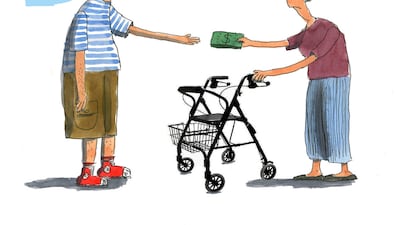I'm ecstatic. My son tells me he wants to be a child forever - because he loves his life - phew. But realise he, and I, are on the losing side. He will grow up and chances are I won't be the apple of his eye for much longer.
He's 10 going on 35 in terms of his quest for self-sufficiency, seeking independence in all sorts of ways. Schemes to earn have been hatched, he can't wait to have a bank account, and is desperate to handle hard cash.
I am confused and concerned. Here's the official line - gleaned from many a study: shaping the financial behaviour of children appears to have long-lasting effects in terms of their money-related behaviour and decision-making as an adult.
OK. So how do I go about this?
The farce is that I write about money and life - and am struggling to come up with ways to "best" enable my children to learn about handling, well, both, I suppose. But let's stick with the money part for now. Here's what I think:
. Start early
. Give more than you set out to
. Establish rules around what it's for
. Don't link it to housework
. Step away
. And whatever you do, don't believe the headlines.
Here are real examples, reporting the findings of studies: Pocket money is the key to strong financial skills in later life and children who are given pocket money become poor savers.
The interesting finding in the second study is that a 1 per cent increase in a child's allowance is associated with a 22 percentage point fall in the probability of saving.
Rubbish I say. Not only is it conflicting but there are too many variables. For example, how much is given? What does it do for the child? What are the social contracts that the parents agree with their offspring? Is it linked to anything - like doing housework?
I am dead against earning from household chores. We are family, we share a home, we are people who get on and do what needs doing.
I'm all for earning from part-time work. Turns out this is positively associated with the probability that the child saves.
Research says different sources of income received by children appear to influence their saving behaviour in contrasting ways. For example almost a quarter of children (22 per cent) spend their pocket money immediately - this is from a study involving more than 4,000 children over a nine-year period.
Makes sense to me.
This is how the child ends up thinking/ behaving: if the bank of mum and dad is stingy, that's the first bit of money that'll be blown. It's "not worth" keeping. If the bank of mum and dad pays out in ad hoc ways I know I can get some more if I really need it.
Money I work for I know the value of that bit more. I'll keep that. Especially if I know I can wrangle bits out of mum and dad (because they don't stick to their word).
Is this you? You give your child token pocket money, such a small amount as to deem it worthless - and not worth keeping. Then you up their allowance - having instilled in them the "spend it at once because it's never going to amount to much" behaviour - so they blow it on instant gratification.
Take note: having saved as a child increases the probability of saving in adulthood by around 18 percentage points.
Your takeaway: enabling your child to save money, while they are still children, is important.
Things I need to answer for myself include: what spending will my child be responsible for?' How much do I give him?
I love what someone I know does. Her 12-year-old daughter buys all gifts from her pocket money (for friends, family birthdays, etc). Her social spending, and things that she covets - like a snazzy mustard-coloured fedora she came across in Italy - cost her more than a couple of months' allowance. But she is primarily a saver and has oodles of cash, so she bought the hat and wears it constantly.
I find it a challenge to step back and watch decisions being made that I don't agree with. Like buying Pokemon cards - a fad at school at the time that has since been left to gather dust.
We discuss things. But the final decision - with zero emotional blackmail or similar - has to be his.
Here's my 101 on helping our children be financially able:
. Give them enough allowance to do something with. But not so much that it means they can buy that designer top or tech gizmo without saving for it. How much depends on many things: what can you afford, and what you decide it is to cover.
. Establish clear rules around money. What it's to be used for. What happens if it runs out.
. No bailouts. When it's gone, it's gone.
. Home in on the idea of saving money. My son is obligated to save 20 per cent of his pocket money and any money he gets, eg birthday money, and not to touch it until he is an adult.
. Be realistic. Research shows that parents' saving behaviour does not influence that of their children, but financial optimism lowers the probability that their child saves. If you brush money concerns aside believing that tomorrow will somehow bring new fortunes that's your child's takeaway.
. Start now I say, else you'll always be on the losing side. Both of you that is.
Nima Abu Wardeh describes herself using three words: Person. Parent. Pupil. Each day she works out which one gets priority, sharing her journey on finding-nima.com.
pf@thenational.ae
Follow us on Twitter @TheNationalPF

Start them young on financial responsibility
Educate your children on money management from a young age - but make sure you do it the right way.
Most popular today
